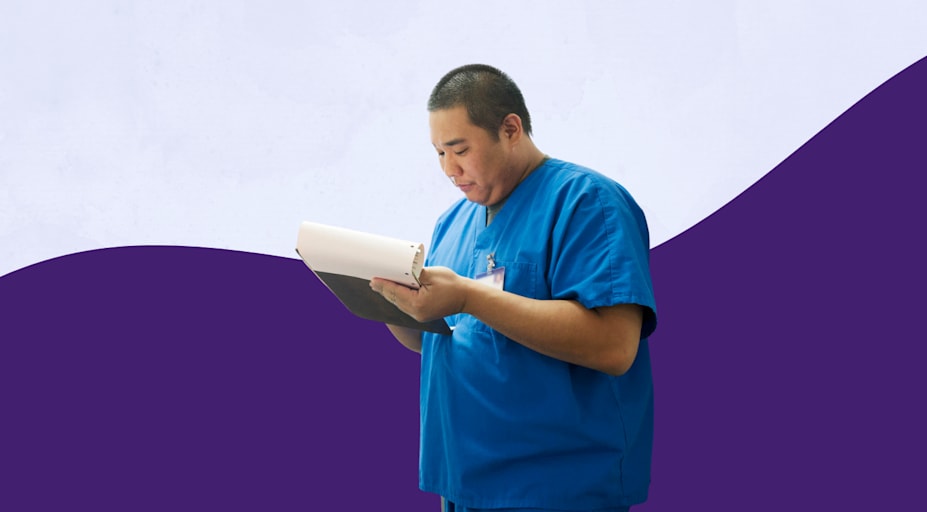New LinkedIn Features Help Nurses Get Hired
 Credit: Getty Images
Credit: Getty Images- Nurses can sort LinkedIn jobs by specialty, license, schedule, and shift.
- Job seekers can customize their profile to stand out to recruiters.
- Leveraging technology can help nurses get hired.
LinkedIn boasts 950 million members — including 3 million nurses in the U.S. alone. And the professional network is a major player in healthcare hiring.
“Every minute, two nurses apply for a job as they look to land their next opportunity,” said Rohan Rajiv, product lead with LinkedIn Talent Solutions.
Nurses actively job searching or investing in professional development and networking can benefit from an active LinkedIn presence.
New tools could make LinkedIn even more important in the nursing employment landscape. Site leaders say the tools, which rolled out in November, can help nurses get hired.
Nurse Jobs Near Me: How LinkedIn’s Tools Can Help You Connect
LinkedIn reported more than 140,000 job posts for registered nurses (RN) as of December. On top of that, more than half a million LinkedIn nurses have used the site’s “Open to Work” designation.
The new LinkedIn tools make it easier for nurses to find relevant job posts. When sorting job postings, nurses can now use new search filters to focus their search by license and specialty. LinkedIn added filters for over 40 nursing specialties, including urgent care, medical-surgical, and behavioral health.
The license filter goes beyond RN licenses, including certified home health aides, clinical nurse specialists, and other advanced practice RNs. Nurses can also sort jobs by shift and schedule to find opportunities that match their needs.
In addition to searching for nursing jobs by specialty, schedule, and more, nurses can also set preferences on their profiles when using the “Open to Work” feature.
Nurses can also stand out to prospective employers using LinkedIn’s new features. Recruiters often search profiles to find potential employees. LinkedIn added 65 new nursing credentials and 35 nursing skills that nurses can add to their profiles.
Finally, LinkedIn’s job alerts feature will notify nurses about job postings that meet their specialty, shift, and license preferences.
Rajiv explained that the new tools can “make it easier for you to land your next nursing job, keep your skills sharp and grow your professional network on LinkedIn.”
Nursing Jobs: Standing Out In A Competitive Market
The current nursing shortages will likely grow in the future. More than 600,000 RNs plan to leave the workforce by 2027, according to 2023 research by the National Council of State Boards of Nursing. And a high number of nurses are open to better job opportunities, as LinkedIn’s “open to work” numbers demonstrate.
When it comes to finding nurse jobs, job seekers have many options. In addition to LinkedIn and other general job sites like Indeed, nurses can leverage healthcare-specific job placement sites. The American Nurses Association (ANA) operates a career center specifically for nurses. Healthcare eCareers specializes in a variety of healthcare roles, including nursing. And HospitalCareers partners with state hospital associations to connect job seekers with hospitals.
Thinking like a recruiter can help nurses identify job opportunities. The ANA recommends that recruiters use social media platforms, including LinkedIn, Twitter, and Facebook, to identify talent. Recruiters are also more likely to use technology to sort candidates by their certifications, specialties, and skills. Job seekers can stand out by updating profiles and resumes with these keywords.
Technology also makes it easier for nurses to connect with recruiters, other nurses, and employers. Investing in professional networking helps nurses develop their careers and find new job opportunities.
You might be interested in

Why Is There a Nursing Shortage?
The U.S. faces a nursing shortage due to an aging population and retiring nurses, creating abundant opportunities for nurses nationwide.

Maryland Nursing Programs Get $6 Million from the State to Help Address Nursing Shortage
To address the Maryland nursing shortage, the governor’s office has designated $6 million in grants to nine nursing programs. Learn more about the grants, recipients, and goals.

The Best Online BSN Programs in 2025
Pursuing a BSN online provides flexibility for aspiring nurses. Explore this guide for a list of the best online BSN programs.